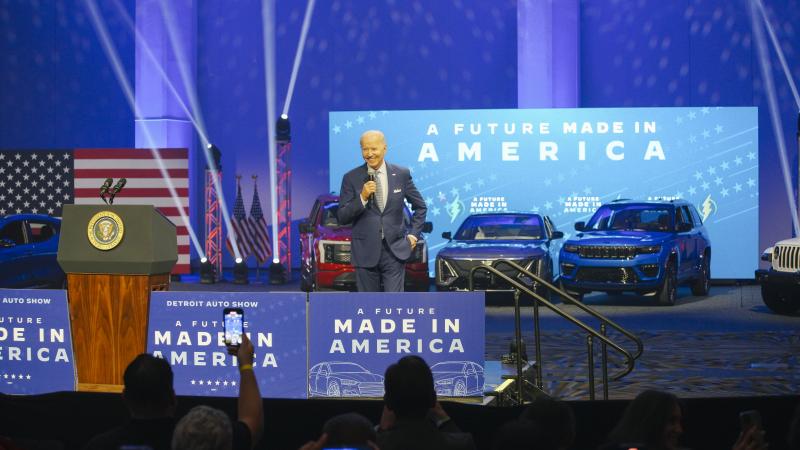November prelude? Big Tech starts effort in Europe to use AI to detect election ‘misinformation’
AI has already has thrown a loop into the U.S. primaries with a fake robocall in New Hampshire
Facebook and Instagram parent company Meta is the latest tech giant to try to increase safeguards against Artificial Intelligence, the most recent – and perhaps most sophisticated – way to peddle dis- and mis-information about this year's elections.
The company announced late last week that it was first pouring resources into European Union fact checking and cybersecurity operations, hiring new staff and signing cooperation deals with regional companies in three European countries.
The goal is to be fully operational as the 2024 U.S. presidential election cycle really gets into full swing, which is expected to happen soon this year because the Democrats in Joe Biden and Republicans in Donald Trump could have their respective nominees before spring, which would start the General Election cycle.
A new report from the federal government's Cybersecurity and Infrastructure Security Agency highlights an array of threats from the cutting-edge technology including “malicious actors, including foreign nation state actors and cybercriminals.”
To be sure, such false information spreaders have long been a part of elections, notable in the 2016 cycle in the U.S. But the emergence of so-called AI is heightening concerns because the quality of the content – including voice, photo and video – looks so incredibly real.
AI has already has thrown a loop into the 2024 primaries.
In New Hampshire, the second nominating state for Republicans, a Democratic operative faked President Joe Biden’s voice for use in robocalls to discourage voter turnout.
The move sparked a multi-state investigation and landed the operative, Steve Kramer, a federal subpoena, which appears to be a sign of more to come.
Meta is not the only one trying to draw a line in the sand. Short-form video giant TikTok – owned by China’s ByteDance – announced a similar initiative on Valentine’s Day. Search giant Google announced its plans for “safegurding its platforms from abuse” and Apple has a subsidiary focused on security research.
Officially, the new efforts are eying potential issues ahead of June elections for European Parliament. The European Union has taken its own steps, requiring social media giants to clearly label AI-generated content.
The elections across 27 European nations are among the headline races on a global election calendar that has never seen so much action. Yet to come in 2024: elections in India, Mexico, the U.K., and maybe even Ukraine. All told, countries that combine to feature half the world’s population will cast votes this year.
But all that is likely a dry run for the November vote in the U.S., where the electorate is about as evenly split as could be imagined.
Starting in 2000, the popular vote in every presidential race but one (the exception is from 2008) has been decided by fewer than 5 percentage points. There’s no reason to think the vote eight months from now will change that trend. It wouldn’t take much to tilt the scales one way or the other.
That’s the warning issued by Kramer, the operative in hot water for the Biden robocalls.
Kramer was nominally working for longshot democratic presidential candidate Dean Phillips. But he said his moves were aimed at sounding the alarm, and he’s drawn parallels between himself and Paul Revere, who’s famous “The British are coming!” warning in 1775 has become part of Revolutionary War folklore.
“This is a way for me to make a difference and I have,” Kramer said. “For $500 I got about $5 million worth of action, whether that be media attention or regulatory action.”
Paul Carpenter, the New Orleans street magician who earned $150 to imitate Biden’s voice for Kramer’s project, had his own warning.
“It’s so scary that it’s this easy to do,” Carpenter said. “People aren’t ready for it.”
Still, not everybody will likely be happy about in the increase in so-called "fact-checkers."
Conservatives argue that Facebook, which hires independent fact-checker, and other social media giants suppress content from their politicians and other messengers.
Meta founder and CEO Mark Zuckerberg stated in 2016 after meeting with such critics, “The reality is, conservatives and Republicans have always been an important part of Facebook."
But they remain skeptical.
"Each of these Big Tech CEOs has made public statements claiming to operate his company without political bias," Utah Republican Sen. Mike Lee said in 2022. "Clearly, that is false. These claims make me think there is a good case to be made that these companies are engaging in 'unfair or deceptive trade practices' in violation of federal law."
The Facts Inside Our Reporter's Notebook
Links
- faked President Joe Bidenâs voice
- a federal subpoena
- ainât seen nothing yet
- threats from the cutting-edge technology
- Union fact checking and cybersecurity operations
- announced a similar initiative on Valentineâs Day
- safegurding its platforms from abuse
- security research
- of June elections for European Parliament
- clearly label AI-generated content
- India
- Mexico
- the U.K.
- Ukraine
- decided by fewer than 5 percentage points
- The British are coming!â
- This is a way for me to make a difference
- People arenât ready for it















